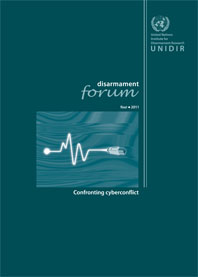The spectre of cyberconflict has finally captured the world's attention and imagination—from the highest levels of governments, to the covers of magazines, to the scripts of both Hollywood and Bollywood. Putting the doomsday hype aside, the fact that new technologies are exploited for offensive and defensive purposes is nothing new. Cyberconflict is simply conflict carried out with the latest “weapons” humanity has at hand. What is challenging about the issue of cyberconflict is that it exploits, in many cases, widely used dual-use technologies such as computer networks and the internet itself, and that the number of potential actors—governments, hackers, terrorists, the private sector, criminals, and even unwitting computer users—has exponentially grown.
Technological development often rushes ahead of legal, definitional and ethical debates—and cyber development is no different. The international community is now starting the process of discussion with the goal of reaching common understandings. This issue of Disarmament Forum is a contribution to that critical discussion.
Citation: Kerstin Vignard (ed.) (2011). "Disarmament Forum: Confronting Cyberconflict", UNIDIR, Geneva.
Disponible aussi en français.
Content
- Editor’s note, Kerstin Vignard
- Cyber operations and jus in bello, Nils Melzer
- Cyber offence and defence as mutually exclusive national policy priorities, Brian Weeden
- Transparency and confidence-building measures in cyberspace: towards norms of behaviour, Ben Baseley-Walker
- Achieving mutual comprehension: why cyberpower matters to both developed and developing countries, John B. Sheldon
- Confidence-building and international agreement in cybersecurity, James Andrew Lewis
- UNIDIR focus
